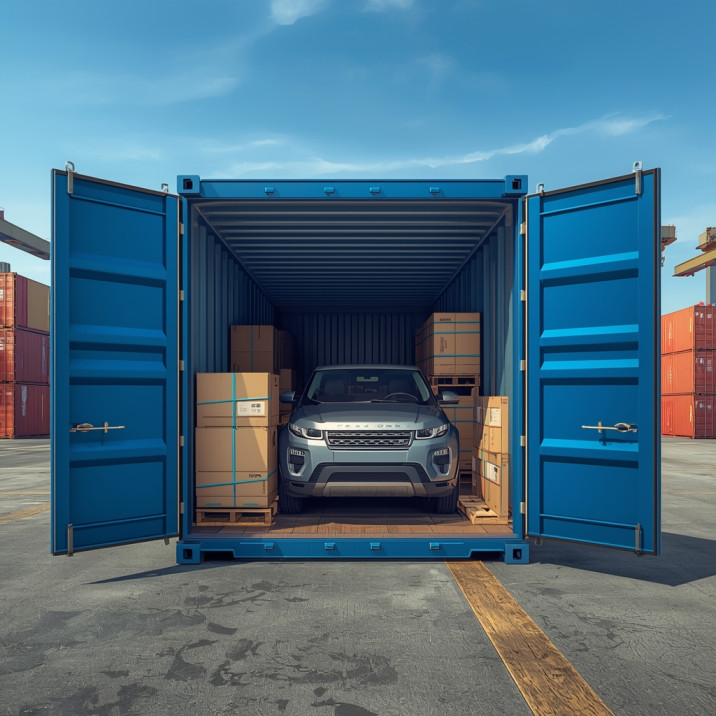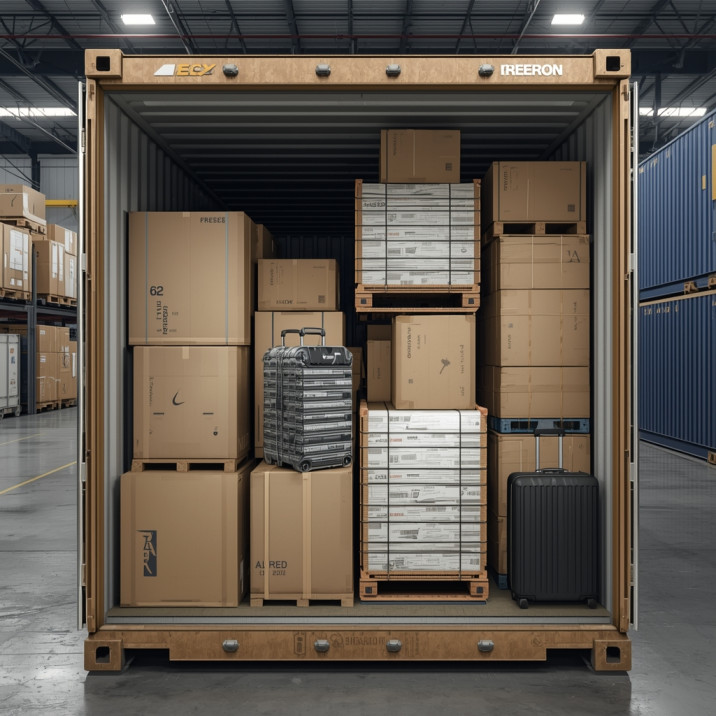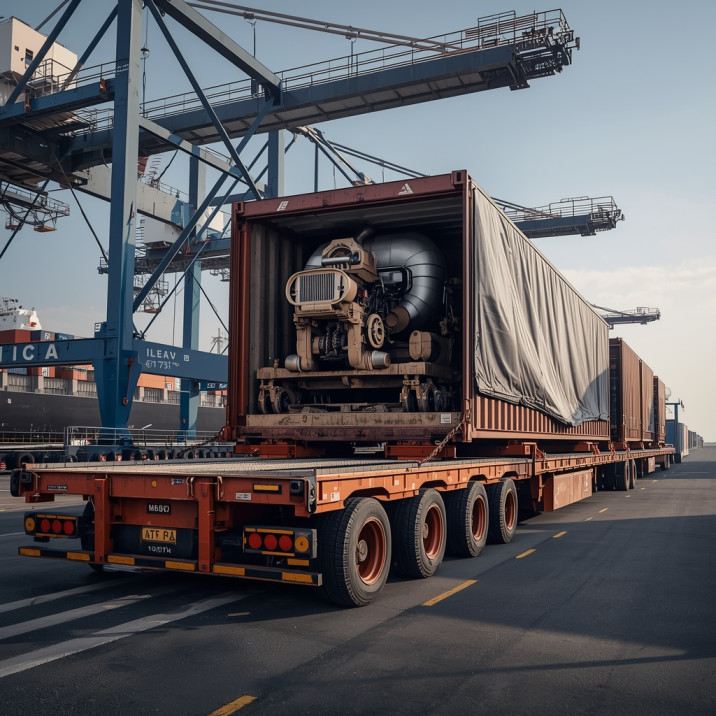If you searched “ship a container to Pakistan,” USA to Pakistan Container Shipping, or just need to get Ocean Freight to Pakistan or just need to get Overall International Container Shipping Pakistan information, you’re in the right place.
This guide explains how container shipping from the USA to Pakistan works, including service options, container types, cargo compatibility, transit times, costs, and documentation requirements.
In general, container shipping is one of the most flexible and widely used methods for exporting cargo to Pakistan. Specifically, it supports personal shipments, commercial exports, vehicles, boats, palletized freight, machinery, and oversized cargo, with multiple loading and handling options available.
Meanwhile, All Transport Depot Inc. operates as a licensed and bonded FMC NVOCC (#021693) and coordinates container shipments from anywhere in the USA to major ports in Pakistan through established global ocean carriers.
🚢 Ship with Confidence. Partner with world-renowned NVOCCs and leading global ocean carriers.
👉 Get a Rate:
https://alltransportdepot.com/roro-shipping-cost/
👉 Place Your Order:
https://alltransportdepot.com/place-order/
📲 WhatsApp: +1 (470) 791-4497
📞 Call: +1 (678) 528-5794
📧 Email: ship@alltransportdepot.com
All TransportDepot Inc.
FMC Licensed & Bonded NVOCC #021693
Get Ocean Freight to Pakistan
Container Shipping Services to Pakistan
Container shipping services to Pakistan are structured to support both private and commercial exporters, while also offering flexibility based on cargo type, loading preference, and location.
🚪 Door-to-Port Shipping
In this case, Door-to-Port shipping includes pickup of cargo from a residential address, business, dealership, or warehouse anywhere in the USA, followed by export handling and ocean transport to Pakistan.
Accordingly, this option is commonly used for:
International relocations -Ocean Freight to Pakistan
Household goods and personal effects
Boats and vehicles
Commercial exports shipped directly from origin
🏠 Container Delivered to Your Location for Loading (Self-Load Option)
Door-to-Port Container Delivery for Client-Managed Loading
As part of Door-to-Port service, a container may be delivered directly to a residence or business for client-managed loading. In practice, this option is selected by shippers who want direct oversight of packing and loading.
In this scenario:
-
First, an empty container is delivered on a chassis
-
Then, the container remains on the chassis throughout loading
-
Next, the client completes loading
-
Finally, the container is returned to the terminal for export to Pakistan
Accordingly, this option is commonly used for:
-
Household goods
-
Furniture
-
Mixed cargo
-
Palletized items
Access & Loading Considerations
-
In addition, appropriate loading equipment must be available where required
-
Likewise, vehicles or machinery typically require ramps, docks, or lifting equipment
-
However, if loading extends beyond the scheduled window, additional charges may apply
-
Furthermore, residential or HOA-managed properties may require advance approval
-
Ultimately, any third-party costs (property access restrictions, extended truck time, or local fees) are passed through to the shipment account
🏢 Warehouse-to-Port Shipping
Warehouse-to-Port service is ideal for shippers who prefer professional handling and loading. In this case, cargo is delivered to a U.S. export warehouse, where containers are loaded, secured, and prepared for ocean transport.
Accordingly, this option is commonly used for:
-
Vehicles
-
Boats and marine equipment
-
Palletized commercial freight
-
Machinery and crated cargo
-
High-value or complex shipments
🔒 Professional Warehouse Loading
Warehouse loading allows trained personnel to handle:
-
Blocking and bracing
-
Weight distribution
-
Cargo separation
-
Compliance with ocean carrier and terminal standards
As a result, this approach reduces risk and is recommended for:
-
Boats
-
Machinery
-
Oversized cargo
-
Mixed loads
📦 Shipper-Owned Containers (SOC)
Shipper-Owned Containers (SOC) may be used provided the equipment meets port and carrier acceptance requirements. In this case, SOC shipments typically include:
-
Trucking
-
Export filing
-
Ocean booking
-
Terminal coordination
SOC containers generally must:
-
Be seaworthy and watertight- Before you buy a container, be sure to ask for the seaworthy and watertight certificate
-
Be neutralized (no shipping-line branding or prefixes)
-
Pass terminal inspection prior to acceptance
However, containers that do not meet acceptance standards may be subject to:
-
Additional handling
-
Repositioning
-
Rebooking charges
What Can Be Shipped in a Container to Pakistan?
Container shipping supports nearly all cargo types. In general, if cargo can be safely secured and complies with export regulations, it can typically be shipped by container.
Accordingly, common containerized cargo includes:
-
Vehicles (cars, SUVs, vans, motorcycles)
-
Boats & marine equipment (trailered boats, jet skis, small vessels)
-
Household goods & personal effects
-
Furniture and mixed cargo
-
Palletized freight (commercial or wholesale)
-
Machinery & industrial equipment
-
Construction materials
-
Crated or boxed shipments
-
Oversized and non-standard cargo (open-gauge)
Ultimately, if your cargo fits in — or on — a container, it can typically be shipped to Pakistan with the correct equipment and documentation.
All Container Types Available for Shipping to Pakistan
Different cargo types require different container configurations. Accordingly, available container options include:
-
20-Foot Standard Containers
-
40-Foot Standard Containers
-
40-Foot High Cube Containers
-
Open-Top Containers
-
Flat Rack Containers
-
Open-Gauge Containers
-
Refrigerated (Reefer) Containers
-
Hazmat-Approved Containers
-
Shipper-Owned Containers (SOC)
In particular, open-top, flat rack, and open-gauge containers are commonly used for boats, machinery, industrial cargo, and oversized freight that exceed standard container dimensions.
How Cargo Is Loaded Into Containers
Loading methods vary based on cargo type, size, and origin location. Accordingly, common methods include:
-
Warehouse loading using forklifts and professional bracing
-
Client-managed loading at a residence or business
-
Crane-assisted loading for boats, machinery, or SOC containers
-
Ramp or dock loading for rolling cargo
-
Palletized loading for boxed or commercial freight
Ultimately, selecting the correct loading method helps ensure port acceptance, cargo safety, and smooth customs processing.
Who Typically Ships Containers to Pakistan?
Container shipping to Pakistan is commonly used by a wide range of customers. In particular, this includes:
-
Families relocating internationally
-
Auto exporters and dealerships
-
Boat owners and marine businesses
-
Furniture and mixed-cargo shippers
-
Commercial exporters and wholesalers
-
Contractors shipping equipment into the EU
🚢 Ship with Confidence. Partner with world-renowned NVOCCs and leading global ocean carriers.
👉 Get a Rate:
https://alltransportdepot.com/roro-shipping-cost/
👉 Place Your Order:
https://alltransportdepot.com/place-order/
📲 WhatsApp: +1 (470) 791-4497
📞 Call: +1 (678) 528-5794
📧 Email: ship@alltransportdepot.com
All TransportDepot Inc.
FMC Licensed & Bonded NVOCC #021693
Why Ship a Container to Pakistan?
Pakistan is a key logistics gateway to Southern Europe, supported by modern port infrastructure and efficient customs procedures. Consequently, shipping a container to Pakistan provides direct access not only to the Portuguese market but also to the broader European Union. Moreover, its strategic Atlantic location strengthens trade routes between North America and Europe. Therefore, many exporters and private shippers select Pakistan as their primary EU entry point.
Accordingly, container shipping to Pakistan proves particularly well-suited for:
-
First, international relocations
-
Next, vehicle and boat exports
-
Additionally, commercial and wholesale cargo
-
Likewise, furniture and personal effects
-
Finally, machinery and industrial equipment
Transit Times When Shipping a Container to Pakistan
Transit times vary depending on the departure port in the U.S. Generally speaking, estimated ocean transit durations are as follows:
-
East Coast (New York, Savannah): 20–28 days
-
Gulf Coast (Houston): 22–30 days
-
West Coast (Los Angeles, Oakland): 28–35 days
Nevertheless, transit times can fluctuate due to carrier schedules, port congestion, weather disruptions, and seasonal demand. Hence, booking early and maintaining flexibility helps ensure the best available sailings.
Shipping Rates to Pakistan (USA → Pakistan)
Shipping costs depend on container size and origin port. Typically, estimated rate ranges include:
20-Foot Container, For Example
-
East Coast: $3,200 – $4,500
-
Gulf Coast: $3,500 – $4,800
-
West Coast: $4,000 – $5,200
40-Foot Container, For Example
-
East Coast: $5,200 – $6,800
-
Gulf Coast: $5,500 – $7,000
-
West Coast: $6,000 – $7,500
Still, rates vary depending on container type, port of loading, cargo specifics, and carrier surcharges.
Main Ports in Pakistan for Container Shipping
Pakistan boasts a robust and expanding seaport and maritime logistics infrastructure that supports international container shipping, RoRo vehicle transport, project cargo, heavy machinery freight, bulk commodities, breakbulk shipments, and oversized equipment exports. Consequently, choosing the appropriate Pakistani destination port is essential for ocean transit time, inland trucking distribution, intermodal rail connections, customs clearance, import processing efficiency, and last-mile delivery when shipping a container from the USA to Pakistan.
Below are the two primary international container ports in Pakistan commonly used for U.S.–Pakistan ocean freight, full-container-load (FCL) shipments, consolidated cargo, commercial exports, household goods relocations, and vehicle imports.
⚓ Port of Karachi — Southern Pakistan
Best for: Containers, vehicles, household goods, commercial cargo, international relocations, RoRo shipments, palletized freight, project cargo, personal effects, import/export shipments
The Port of Karachi is Pakistan’s largest and busiest seaport, serving as the country’s main international gateway for container shipping, RoRo vessel operations, vehicle imports, and commercial ocean freight. Situated on the Arabian Sea coast, it offers direct access to Karachi’s metropolitan area and southern Pakistan, making it a key destination port for U.S.–Pakistan container shipping, inland delivery, and regional distribution.
Therefore, key advantages include:
-
Extensive container terminal infrastructure and advanced cargo-handling equipment
-
Strong road and rail intermodal connectivity for efficient inland transport
-
Streamlined customs clearance and port processing by Pakistan Customs
-
Regular ocean sailings from major U.S. container ports
-
Excellent access for inland trucking throughout southern and central Pakistan
In practice, shippers frequently use the Port of Karachi for:
-
Household goods and personal effects shipments
-
Vehicle and motorcycle imports to Pakistan
-
Commercial and palletized export cargo
-
Mixed, consolidated, and full-container-load (FCL) shipments
🔗 Karachi Port Trust:
https://kpt.gov.pk
⚓ Port Qasim — Near Karachi, Southern Pakistan
Best for: Containers, vehicles, bulk cargo, industrial freight
Port Qasim, located east of Karachi, is Pakistan’s second-largest deep-water port. Specifically, it handles containerized cargo, vehicles, industrial equipment, and bulk freight destined for southern Pakistan and adjoining regions. Moreover, its strategic location enhances inland logistics connectivity.
Consequently, key advantages include:
-
First, modern deep-water container terminals with high capacity
-
Next, efficient handling of industrial and commercial cargo
-
Additionally, strong logistics connections to southern Pakistan
-
Furthermore, reduced inland transport time for Karachi-area destinations
-
Finally, reliable handling of oversized and project cargo shipments
For these reasons, shippers often select Port Qasim for:
-
In particular, commercial and wholesale imports
-
Likewise, industrial machinery and equipment
-
Also, vehicles and rolling cargo
-
As well, oversized or non-standard container shipments
🔗 Port Qasim Authority:
https://portqasim.com.pk
Choosing the Right Port in Pakistan
When shipping a container to Pakistan, generally, the decision between Karachi and Port Qasim depends on several important factors. Specifically, these include:
-
First, the final delivery location
-
Next, cargo type and dimensions
-
Additionally, inland transport requirements
-
Finally, customs handling preferences
Ultimately, both ports can accommodate standard containers, high-cube containers, open-top units, flat racks, and open-gauge cargo, depending on shipment requirements.
Customs & Documentation (Pakistan – 2026)
When shipping a container to Pakistan, customs clearance is a vital step. Therefore, shippers must prepare all necessary documentation beforehand. Typically, required documents include:
-
First, the Bill of Lading
-
Next, a Commercial Invoice and Packing List
-
Additionally, a passport or company registration
-
If applicable, the vehicle title
-
Likewise, the Pakistan Customs Declaration Form
Import Duties & Taxes – International Container Shipping Pakistan
Upon arrival in Pakistan, customs authorities may levy charges. Consequently, importers should be prepared for the following:
-
Primarily, customs duty based on HS classification
-
Additionally, sales tax (GST) and port handling fees
-
In some cases, extra assessments for restricted or regulated goods
📞 Pakistan Customs (Karachi): +92 21 9920 4000
FAQs – Shipping Containers to Pakistan
Can a container be delivered to a home for loading?
Yes. In many cases, Door-to-Port service delivers the container directly to a residence or business for client-managed loading, subject to access and scheduling considerations.
When a container is delivered to my door, will it be placed on the ground or remain on a chassis?
Typically, the driver keeps the container on a chassis during the loading window. Ground placement remains uncommon and may require special equipment, permits, or additional fees.
How long can I keep the container for loading?
In most cases, we schedule a loading window—often 1–3 days—although some locations allow only a short live-load period (such as two hours). Additional time may result in daily charges.
Can boats and vehicles ship in containers?
Yes. In general, we ship boats, vehicles, and marine equipment using standard, open-top, flat rack, or open-gauge containers. Although this may be true Roro is a great alternative.
Do services support oversized cargo?
Yes. Accordingly, we offer open-top, flat rack, and open-gauge container options.
Do I need special equipment to load heavy cargo?
Yes. As a matter of fact, You may need forklifts, ramps, cranes, or docks to load vehicles, boats, or machinery.
Is export documentation handled?
Yes. We typically handle U.S. export filings and coordination together with Ocean Freight to Pakistan
What documents are required to ship to Pakistan?
Generally, you must provide export filings, commercial invoices, packing lists, vehicle titles (if applicable), and consignee identification. Above all
Generally, this includes export filings, commercial invoices, packing lists, vehicle titles (if applicable), and consignee identification.
Will I need to pay duties or taxes in Pakistan? USA to Pakistan Container Shipping
Yes. Depending on the shipment and Ocean Freight to Pakistan. Portuguese customs may assess import duties, VAT, or clearance fees.
Can customs clearance be arranged in Pakistan?
Yes. Additionally, local agents can assist with destination customs processing to help with International Container Shipping Pakistan
Is marine insurance available?
Yes. Additionally, we can arrange marine cargo insurance upon request. this is not part of Ocean Freight to Pakistan.
Can I track my container during transit? USA to Pakistan Container Shipping
Yes. Moreover, we can arrange inland delivery from the port to the final Port destination. All things considered, when considering USA to Pakistan Container Shipping
Start Your 2026 Shipment to Pakistan- International Container Shipping Pakistan
All Transport Depot Inc. All in All actively provides Door-to-Port, Warehouse-to-Port, and SOC container shipping services from anywhere in the USA. From pickup through export documentation and ocean transport, For instance our team manages every shipment with precision, professionalism, and care.
👉Place Your Order:
https://alltransportdepot.com/place-order/
📧 Email: ship@alltransportdepot.com
📞 Call: +1 (678) 528-5794
📲 WhatsApp: +1 (470) 791-4497

Ryan is an experienced truck driver at Lone Star Auto Transport. He’s logged thousands of miles, safely delivering vehicles across the vast expanse of Texas and beyond. His commitment to on-time deliveries and vehicle care is unmatched.



